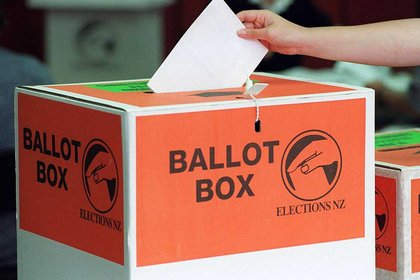
Political views are divided across a range of issues, but a recent survey reveals a few areas Kiwis do agree on in the lead up to the October 17 general election.
Voters, of course, disagree on all sorts of issues as public policy debates fire up ahead of the October 17 general election – but a survey has found there are plenty of things Kiwis do agree on.
Results of a recent online survey created by Massey University and hosted by Stuff media reveals voter opinions across political persuasions concur on several key issues heightened by the pandemic – from the desirability of introducing the living wage to the need to embrace innovation and scientific research in the post-COVID-19 economic recovery period.
Politics lecturer and project leader for the survey Associate Professor Grant Duncan, says; “This online reader survey gives us a rough guide to the distribution of opinions through the electorate.”
Nearly 13,000 New Zealanders responded to the survey of 20 questions on a range of topics, between August 30 and September 13. It was the second of two surveys designed to gauge public opinion in the lead up to the election, complemented with opinion pieces by Massey academics to provide informed, evidence-based commentary on key issues covered in the survey. The samples in both surveys were weighted to more conservative demographics.

Associate Professor Grant Duncan, project leader for the Massey/Stuff surveys.
Popular support for business innovation
Just over half (51.4 per cent) of all respondents felt there would be more damage to the economy in the long run if we had not had a strict lockdown, while 36.2 per cent felt the costs of lockdown had been too high and that they outweighed the public health benefits.
A resounding 87.8 per cent agreed we need to use this opportunity [a period of COVID-19 reset] to support innovations in all aspects of how we do business.
Other items on which the survey found majority across-the-political-spectrum support:
- We need to use this opportunity to recognise the economic value of voluntary caring and community work
- We need to use this opportunity to invest more in scientific research and teaching for the benefit of the nation
- There was consistent across-the-political-spectrum disagreement with the proposal that we make it easier for foreign investors to buy land in New Zealand.

PhD student Sarah Choi and Professor James Lui, from the School of Psychology, who co-created the surveys to gauge public opinion on a wide range of issues.
Living wage support
Most Kiwis across the board at least approve of the living wage. Making the living wage the legal minimum wage has roughly 80 per cent support from Labour/Greens supporters. But only small minorities think it is “not a good idea at all”: 13 per cent overall and only 21 per cent of National supporters. However, 57 per cent of National supporters agreed that the living wage is a good idea – they just wanted it to be voluntary for employers. The living wage rate for 2020 was set at $22.10 per hour. The legal adult minimum wage is currently $18.90 per hour.
“It’s mainly on the left where there’s support for making it the legal minimum,” says Associate Professor Duncan. “Labour’s policy is to make the living wage the minimum for government employees.”
More survey results:
- Asked if they felt their political views were liberal or conservative: Liberal – 34 per cent; Conservative – 27 per cent; not sure or in the middle – 38.5 per cent.
- When asked which of the two leaders of the main parties they would prefer, 47.4 per cent said Labour’s Jacinda Ardern and 43.4 per cent said National’s Judith Collins, and nine per cent were not sure.
- Two-thirds (67.6 per cent) indicated they would vote in favour of the End of Life Choice Bill in the referendum, and less than a quarter (21.2 per cent ) voted against, with 11.2 per cent unsure or not voting on it.
- Half felt the government response to COVID-19 has been successful. A quarter disagreed, and a quarter were unsure.
- Asked which leader they felt closest to, 41.8 per cent chose Jacinda Ardern, 27.7 per cent chose Judith Collins and the next highest was David Seymour at 15.7 per cent. (ACT supporters were over-represented in the sample).
- There was an even split (39.9 per cent each) for those who agree or disagree with the statement: “We need to use this opportunity to support indigenous solutions and self-determination for whanau and hapū.”
While the surveys (including the first in July which nearly 75,000 Stuff readers responded to) are not representative samples, Associate Professor Duncan says they provide insights into the distribution of political opinions across the population as we emerge from the massive impacts of a global pandemic and prepare for the election. “The survey sample was heavily skewed towards being older, wealthier, more male, educated, and more white than a nationally-representative samples.”
Views differ on economic costs of COVID-19
Social psychologist Professor James Liu and PhD candidate Sarah Choi, who co-created the survey with Associate Professor Duncan, add that some COVID-19-related issues appear to be polarised, with 52 per cent of National Party supporters agreeing with the claim that the recent outbreak of COVID-19 (first notified on August 11) has made them lose faith in the government, compared to only four per cent of Labour Party supporters.
A majority of National supporters also agreed that the economic costs of lockdown are too high, outweighing public health benefits (65 per cent), compared to only a small minority of Labour supporters who agreed with this claim (three per cent).
“While a vast majority of Labour supporters agreed that the government has been honest with us about what it knows and does not know about COVID-19 (91 per cent), only 12 per cent of National supporters agreed,” Profesor Liu says.
Policy changes needed to take advantage of the opportunities provided by COVID-19 were also split along partisan and ideological lines, with National and ACT supporters favouring neo-liberal prescriptions (reducing regulations, making things easier for business), and Labour and Green supporters recommending more socialistic solutions (reducing carbon emissions, adding a universal basic income), he says.
“What appeared to be common across different party supporters were levels of political engagement, with 18 per cent of National and 17 per cent of Labour supporters more keen to vote now because of the lockdown and delayed election, while only two per cent of National and one per cent of Labour supporters were less keen to vote,” says Ms Choi. “Only a minority of the total sample agreed that they are not really interested in politics (2.9 per cent overall), compared to a majority agreeing that they follow what’s going on (71 per cent).”